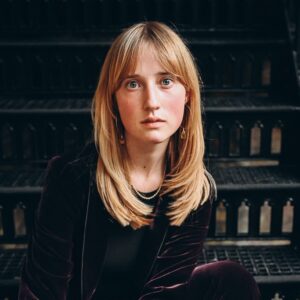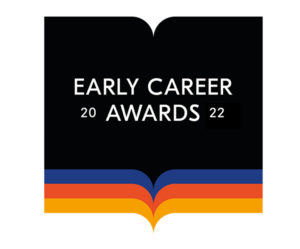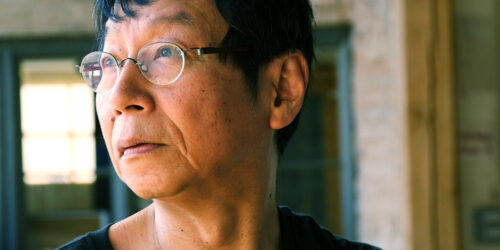
Writer, model and playwright Vida Adamczewski sat down with us in the Cottage to discuss her writing habits, favourite reads and recent Dragon Hall residency.
As part of our Instagram ‘Meet the Residents’ series, Vida kindly agreed to talk to us about her writing and her stay so far in Norwich. We talked about building a community of writers, the importance of not putting too much pressure on hitting those writing targets, and her feelings on occupying and writing in a new space.
Read on for our full conversation with Vida.
What’s your name and can you tell me a little bit about yourself?
My name is Vida Adamczewski. I am writer, currently polishing up my first collection of stories with Toothgrinder Press and writing my first novel.
Where do you usually live?
I live in south east London, in a flat with my partner and two friends. The flat is very close to where I grew up, and this bit of the city really feels like home.
What’s your favourite book?
Happening – Annie Ernaux. I was given this book by a friend. We had both had abortions. It’s become a guiding light for me, reminding me to write frankly and bravely about the body.
Both of these books meticulously detail the resilience and resourcefulness of a woman who has been estranged from society.
The Wall – Marlen Haushofer. Unsettling in its matter of factness, The Wall is my favourite apocalyptic novel. I read it in the autumn.
In different ways, both of these books meticulously detail the resilience and resourcefulness of a woman who has been estranged from society.
What’s the last thing you read that changed how you thought about the world?
Everything I read changes my perspective a little bit, but I recently returned to Anne Boyer’s The Undying – my mum has been having cancer treatment – and was struck again by how she talks about living in a medicalised body and how dissociative that can be. It’s not a new view to me per se, but it really brought it home to me, reminding me that I do see the world through the lens of my illness, through pain.
What’s your favourite part of Norwich so far?
I’ve enjoyed walking around, past all the churches and higgledy piggledy houses. I particularly like my walk up to Anderson’s meadow, the old railway lines and the green and the path going on for miles, straight. Really good for thinking.
What are you working on?
I am working on some material for a book, and editing some short stories too. But my main aim for this residency was to remember why I write and get back in touch with my writing instinct, which had disappeared a bit in the last few months.
What do you think your biggest aspiration or goal is with your writing?
Writing is quite myopic, so at the moment my biggest aspiration is to finish this project I’m working on, which is a novel? But if I can pull myself out of that short term hole, I suppose I’d like to be able to support myself with my writing, financially, and to develop a really strong and varied community of writers in London. Writing can be lonely, and while I have a group of poets that I read with, I’d love to connect with some prose writers who might sympathise with my 40,000 word wall!
What advice would you give to early career or young writers?
I feel under qualified to answer that myself as I am still pretty young and “emerging”. Feel like I’ll be emerging for the next 40 or 50 years to be honest.
You don’t need to wake up at 6 and write for 3 hours every day… Just find something you’re interested in and write about it.
I suppose I’d say two things –
1) Read your work aloud, you’ll be able to tell whether it’s good or not much faster than if you skim it on a Word doc.
2) I am actually stealing this from Megan Bradbury who met with me this week. She kindly told me to find my own process, and to trust my gut. You don’t need to wake up at 6 and write for 3 hours every day, you don’t need to plan the whole plot before you start writing. Just find something you’re interested in and write about it. Even if your first take seems like rubbish to you, have faith in the power of the second draft.
How different is the cottage to normal?
It couldn’t really be more different. I don’t have a quiet desk to write at at home, here there are two! I share a flat, I share a bedroom, so I’m rarely alone – here I’ve been alone most of the time. Normally I write behind the till at the Review Bookshop that I work in, or when I’m in bed.
Writing without noise or interruption… is incredible.
I have a chaotic schedule and a fatigued body so I fit my own writing around illness, around work, around applied and commissioned writing projects, and around seeing my family and friends. I’ve never had so much time to write and it’s been strange – a bit eerily reminiscent of when I was bed bound – but I’m trying to remember to get out of the cottage, that walking, exploring and talking to the amazing team here is part of the writing process too! And when I have hit flow, it’s been amazing. Writing without noise or interruption or self consciousness or distraction is incredible. I wish I had access to that more regularly.

Vida Adamczewski was born in Peckham and read Politics, Philosophy and Economics at Oxford University. While studying, Vida was diagnosed with Hypermobility Syndrome and Chronic Fatigue, conditions that render her frequently bed bound. Her writing has appeared in Ambit Magazine, Document Journal, The Byline Times, and The Mays. In July 2021, a staged reading of Vida’s lyric play Amphibian was performed at the Playmill New Writers Festival at the King’s Head Theatre in Islington.

Vida’s residency was courtesy of the UEA New Forms Award, part of the Early Career Awards. The UEA New Forms Award celebrates fiction from early career writers that explores the boundaries of possibility. University of East Anglia has a reputation for creative writing spanning half a century. In collaboration with National Centre for Writing this award exists to champion bold innovation in craft, rewarding a daring new voice in fiction.
You may also like...
Apply for a Desmond Elliott Prize Residency 2023
NCW is offering three fully funded writing residencies for debut novelists

7th December 2022
‘A Room of One’s Own’ writer in residence revealed
“Finding the time or place to write came secondary, if at all.”

17th July 2019






